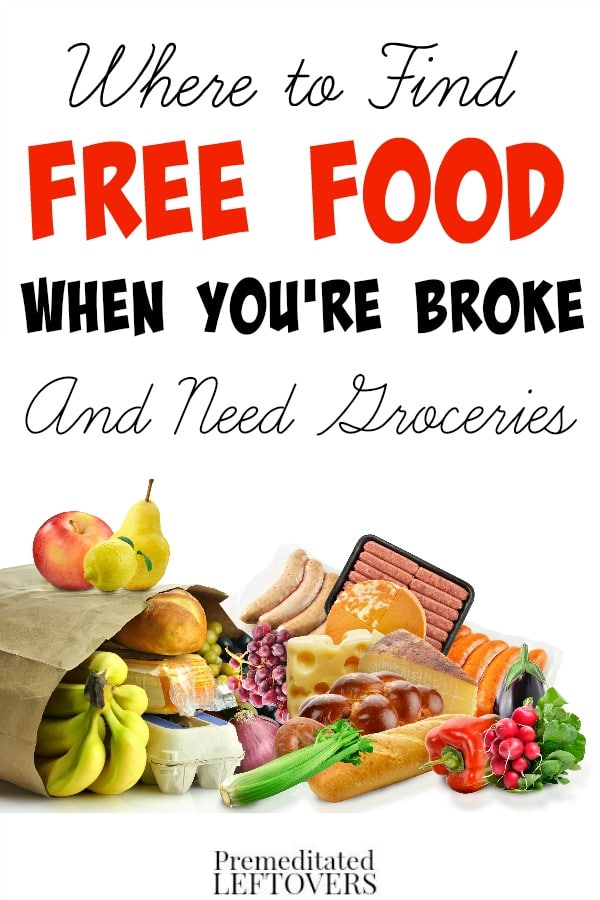There have been times in my life that I literally had nothing to buy groceries with. We were down to 4 or 5 days before a paycheck and all I had left in my cupboard and fridge was a few canned vegetables, some Ramen noodles, and condiments. This went on for a while because in my hometown, good paying jobs were hard to find and although my husband worked full time and some overtime, I was unable to work. We could barely afford our bills.
I always felt guilty about running out of food. Looking back, we were just in a bad situation that wasn’t our fault and we were a struggling newly married couple. If you are finding yourself in this situation, I’m sorry. I know how hard food insecurity can be. The good news is, there are many places you can find free groceries. Here are some starting points on Where to Find Free Food When You’re Broke.
Where to Find Free Food When You’re Broke
Look for local food banks in your area. If you are not sure where to start, check out Feeding America. They have a search tool to help you locate food banks near you. Even some of the smallest communities often have food banks. The good thing about food banks are you can sometimes go to each one up to twice a month. This can help you stretch your grocery budget a little further if you utilize them well. At one point, I was going to several a month and getting food there first before spending our grocery budget. Now, to some this may look like I am taking food before I needed it, but I assure you there was a reason I did this. I would go to these food banks and get what I thought I could use to make meals, minus a few things. Then, with my grocery budget, I would fill in the blanks (buy the missing ingredients). This allowed me to stretch my food budget further and eventually got us to the point where we no longer needed as much help.
Call for help or 211. Most areas in the United States, there is assistance if you dial 211 from any phone, even a cell phone. You just tell them what kind of help you need and they point you in the right direction. On top of this being a great way to find out about help in your area, 211 can often tap into services that are only available through 211. These include specific charities that field calls only from what the operators tell them at 211 and offer help.
Call local churches. I have had some luck in the past speaking with local churches. Sometimes, they will arrange to get you some food or a gift card to a local grocery store. In some cases, they have relationships with local grocers to assist folks as well. I would use this as a last resort since churches often don’t have much money to give to individuals and you don’t want them to feel burnt out.
Learn to forage. If you live anywhere near a rural area, you may be able to forage for some edible weeds, fruit, and mushrooms. It is extremely important that you take someone with you or a guidebook for foraging. Some plants look edible but are actually quite deadly. In some urban areas, there are fruit trees, too. Check with the city to find out if you can pick from them.
Take up bartering. One way we would find food when we were in need was to put on Craigslist that we would help with gardening or harvesting and take payment in the form of food. This obviously works only at certain times of the year depending on where you live, but it can be a great way to get some farm fresh produce.
Apply for WIC or SNAP. I am sure you know about these programs, but they have been life savers to us in the past when we needed the help. One thing you may not know about is the vouchers from WIC for farmer’s markets that can help you get more bang for your SNAP buck if you spend some at the farmer’s markets as well as other stores. I highly recommend signing up for these programs if you aren’t already on them. If you are in a desperate situation, they can often expedite services and you can get vouchers in as little as 24 hours.
In addition to the services above, here are some ways to be self-sustaining that I wish I knew about:
Garden, even if it’s small. One reason I never gardened when I was in this situation was I just figured there was no point. I couldn’t grow much so it wouldn’t be worth it. There are lots of ways to yield more food in containers and SNAP even buys seeds and starts!
Make your own food from scratch and use everything. Making some things from scratch can be time consuming, but if you can do it, you can save a lot. A loaf of bread costs about a quarter to make! Get creative and use everything! Waste is just money you are throwing away. Use scraps to create your own soup or casserole.
Try freeganism. While not for everyone, in many urban areas freeganism is working for some folks. You are essentially dumpster diving and looking for tossed goods. I never did this, but I do know some people who find perfectly useful food this way. It is not without risks, so proceed with caution.
More Ways to Stretch Your Food Budget:
How to Eat Healthy on Food Stamps
How to Live Sustainably on Food Stamps
How to Stretch Your Food Stamp and WIC Budget
How to Build a Depression Era Pantry
Frugal and Filling Depression Era Breakfasts


Leave a Reply